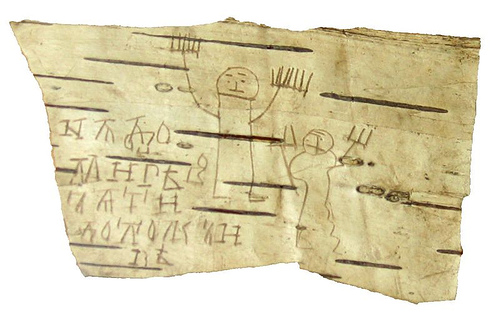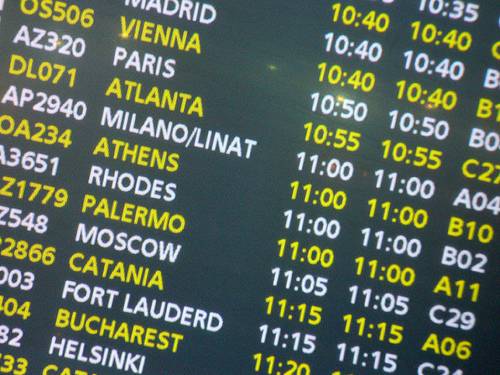A man’s likelihood of being gay increases by 33 percent for each older brother he has.
Society
Some Things Never Change

This is magnificent — it’s a document written on birch bark in 12th-century Russia, unearthed in 1951.
A 6-year-old boy named Onfim was learning to write — and doodling on his homework.
Unshelved
Notable authors on the Vatican’s list of prohibited books:
- Francis Bacon
- Honoré de Balzac
- Giordano Bruno
- Nicolaus Copernicus
- Daniel Defoe
- René Descartes
- Denis Diderot
- Desiderius Erasmus
- Gustave Flaubert
- Galileo Galilei
- Edward Gibbon
- Thomas Hobbes
- Victor Hugo
- David Hume
- Immanuel Kant
- John Locke
- John Stuart Mill
- John Milton
- Blaise Pascal
- Jean-Jacques Rousseau
- Jean-Paul Sartre
- Jonathan Swift
- Voltaire
- Émile Zola
George Bernard Shaw said, “Censorship ends in logical completeness when nobody is allowed to read any books except the books that nobody reads.”
Scrap Paper
In 1946, the inflation rate in Hungary reached 4.19 quintillion percent, a modern record.
By August, all the Hungarian banknotes in circulation would have bought one-thousandth of one U.S. cent.
“Curious Post-Office”
The smallest post-office in the world is kept in a barrel, which swings from the outermost rock of the mountains overhanging the Straits of Magellan, opposite Terra del Fuego. Every passing ship opens it to place letters in or take them out. Every ship undertakes to forward all letters in it that it is possible for them to transmit. The barrel hangs by its iron chain, beaten and battered by the winds and storms, but no locked and barred office on land is more secure.
— Frank H. Stauffer, The Queer, the Quaint and the Quizzical, 1882
The Agony of Defeat

Italian marathoner Dorando Pietri was exhausted and dehydrated as he neared the finish line in the 1908 Olympic Games, and when he entered the stadium he took a wrong turn and collapsed. The umpires helped him up, but he stumbled further and collapsed again. 75,000 agonized spectators watched him fall three more times before he found the finish line; of his total time of 2:54:46, he spent fully 10 minutes on the last 350 meters.
Unbelievably, they disqualified him. The American team complained that he’d received help from the umpires, and he was removed from the final standings. But Queen Alexandra gave him a silver cup, at the suggestion of Arthur Conan Doyle, and Irving Berlin wrote a song for him. He died in 1942 at age 56.
“The Waco Horror”

Between 1882 and 1930, Texans committed 492 lynchings. By most accounts, the most horrible of these was the 1916 slaying of Jesse Washington, a Waco farmhand who had confessed to the rape and murder of a white farmer’s wife.
A jury of 12 whites deliberated for four minutes before declaring Washington guilty. They called for the death penalty, but before authorities could act, he was dragged from the courtroom, doused with coal oil, and suspended alive over a bonfire. A witness wrote:
Washington was beaten with shovels and bricks … was castrated, and his ears were cut off. A tree supported the iron chain that lifted him above the fire. … Wailing, the boy attempted to climb up the skillet hot chain. For this, the men cut off his fingers.
Washington’s corpse was put in a cloth bag and dragged behind a car to Robinson, where it was hung from a pole. Northern newspapers condemned the lynching, but Texas was largely unrepentant. The image above is taken from a postcard (!); on the back someone has written, “This is the barbeque we had last night. My picture is to the left with a cross over it. Your son, Joe.”
Best Served Cold
Excerpt from the will of Joseph Dalby, London, 1784:
I give to my daughter Ann Spencer, a guinea for a ring, or any other bauble she may like better: — I give to the lout, her husband, one penny, to buy him a lark-whistle; I also give to her said husband, of redoubtable memory, my fart-hole, for a covering for his lark-whistle, to prevent the abrasion of his lips; and this legacy I give him as a mark of my approbation of his prowess and nice honour, in drawing his sword on me, (at my own table), naked and unarmed as I was, and he well fortified with custard.
No Vacancy
The world will end on Nov. 13, 2026. That’s according to Austrian cyberneticist Heinz von Foerster, who calculated in a 1960 issue of Science that the human population would reach infinity on that date.
He was joking, but he had a point. To date, population growth hasn’t really inhibited human societies. They’ve just created technology to support larger crowds, which have spawned more inventors, who create more technology, and so on.
Von Foerster’s equation fit 25 data points from the birth of Jesus to 1958, and it stayed on track through 1973. His point was that the doubling time of the human population has been steadily falling, and at this rate it would reach zero in 2026 — so a fundamental change, of some kind, must be coming.
Unfriendly Skies

Due to widespread fear of the number 13, Memphis International Airport does not have a gate numbered A13, B13, or C13; Long Island MacArthur Airport does not have a Gate 13; and Birmingham (Ala.) International Airport does not have a Gate C13.
For the same reason, there has never been an F-13 fighter aircraft in the United States.
